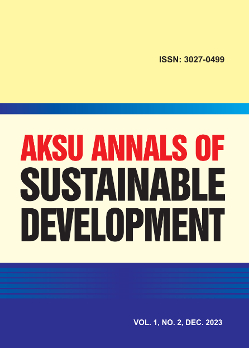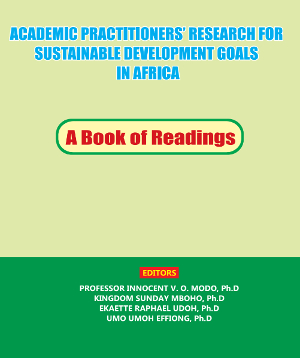CURRENCY SUBSTITUTION AND EFFECTS ON PRIVATE INVESTMENT IN NIGERIA
DOI:
https://doi.org/10.60787/AASD-v2i1-28Keywords:
Currency, substitution, investment, real exchange rate, foreign interest rateAbstract
This study examines the impact of currency substitution on private investment expenditure in Nigeria. Central Bank of Nigeria (CBN) yearly statistical bulletin formed the major source of data for the study. The study employed the ARDL estimation technique to estimate the long and short run parameters. Findings of the study show that domestic interest rate (DIR) coefficient has a negative relationship to the private investment with changes in currency substitution in Nigeria. Based on the above findings, the study therefore suggests that government should through its policy makers strengthen the domestic currencyforeffective interest rate policy to invoke greater confidence among domestic private investors to induce increased investment and growth.
Downloads
References
Adamu, M. B. (2016). Currency substitution and the demand for money in Nigeria: 1980. A thesis submitted to the school of
postgraduate studies, Ahmadu Bello University, Zaria.
Adeniji, S. (2013).Investigating the relationship between currency substitution, exchange rate and inflation in Nigeria: An autoregressive distributed lag (ARDL) approach. Munich Personal RePEc archive online at https://mpra.ub.unimuenchen.de/52551/.
Aigheyisi, O. S. (2015). Currency substitution, inflation and economic growth in Nigeria: A simultaneous equations analysis. The
empirical econometrics and quantitative economics letters 4(1), (March 2015): pp. 33 – 44. ISSN 2286 – 7147 © EEQEL
Akpan, E. O., &Atan, J. A. (n.d).Effects of exchange rate movements on economic growth in Nigeria.CBN journal of applied statistics
(2).
Anowor, O. F., & Okorie, G. C. (2016). A Re-assessment of the impact of monetary policy on economic growth: a study of Nigeria. International journal of developing and emerging economies 4(1), pp.82-90, February 2016.
Anyanwu, J. C. (1993). Monetary economics: Theory, policy and institutions, Onitsha: Hybrid Publishers Ltd.
Anyawu, J.C. (2004). Monetary economics: Theory,policy, and institution. Hybrid publishers Ltd, Onitsha, Nigeria.
Bawa, S., Omotosho, B. S. &Doguwa, S. I. (2015). Ratchet effects in currency substitution: An application to Nigeria. CBN Journal of Applied
Statistics 6(2).
Central Bank of Nigeria (2020): Annual report and statement of accounts, Abuja, Nigeria. www.cenbank.org
Central Bank of Nigeria (2021).Annual report and statement of accounts, Abuja, Nigeria.www.cenbank.org
Doguwa, S. I. (2014). Currency substitution: Evidence from Nigeria. CBN Journal of Applied Statistics 5(2)
Effiong, U. and Ekpenyong, O., (2017). Effect of Community Based Rehabilitation Services and Livelihood Enhancement among
People with Disabilities in AkwaIbom State, Nigeria. InternationalJournal of Economic Development Research and Investment, 8(1), 15 – 30.
Effiom, L. &Ubi, P. S. (2010). Currency substitution phenomenon: Is the Nigerian economy immune? Journal of economic theory 4(1)
ISSN: 1994-8212.
Kalyoncu, H., Isık, A., &Jelilov, G. (2022). Currency substitution: Evidence from Nigeria. The empirical economics letters, 14(7): ISSN 1681
Kumamoto, H. & Kumamoto, M. (2017).Currency substitution and monetary policy effects: The case of Latin American countries.
International Journal of economics and finance; 9(2).
Okorie, N. U. (2012). Global financial crisis; consequences on the Nigeria Agricultural Economy. .Journal of Agricultural Economics and Extensions Research Studies (AGGEERS), 1(1):13-28.
Okorie, N. U., Ekanem, J. T. and Okoro, G. I. (2020).Gender-Based Analysis of Technical Efficiency of Oil Palm Farmers and the
Implication for Sustainable Development in AkwaIbom State.Journal of Agricultural Economics, Extension and Science. 6(2): 124 – 137.
Olomola, P.A. (1999). “An Empirical investigation of currency substitution in Nigeria”, Ife Journal of Economics and finance”, 4(1&2):
-17
Oresotu, F. O. & Mordi, C. N. O. (1992). The demand for money functions in Nigeria: An empirical investigation. Central bank ofNigeria economic and financial review, 30 (1), 63-70.
Tweneboah, G. (2016). Dollarization and macroeconomic instability in Ghana. A Doctoral Thesis submitted in fulfillment of the
requirements for the award of doctor of philosophy.Udoh, U.S. and Madueke, O. (2018).
Public Financial Management and Adoption of Treasury Single Account (TSA) in AkwaIbom State civil services. AKSU Journal Of
Management Sciences, 3( 2),pp. 61 – 83.
Ugwu, O. J. & Philip (2017). Currency substitution in Nigeria; International digital organization for scientific research ISSN: 2550-
IDOSR journal of humanities and social sciences 2(2): 165-177.
Wang, Y. (2017). Demand for money in China with currency substitution: Evidence from the recent data. http://www.scirp.org/journal/me
ISSN Online: 2152-7261 ISSN Print: 2152-7245
Downloads
Published
Issue
Section
License
Copyright (c) 2024 AKSU Annals of Sustainable Development

This work is licensed under a Creative Commons Attribution-NonCommercial-NoDerivatives 4.0 International License.
Manuscript content on this site is licensed under Creative Commons Licenses. Authors wishing to include figures, tables, or text passages that have already been published elsewhere are required to obtain permission from the copyright owner(s) for both the print and online format and to include evidence that such permission has been granted when submitting their papers. Any material received without such evidence will be assumed to originate from the authors.





 ICIDR Publishing House
ICIDR Publishing House